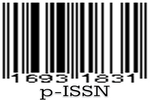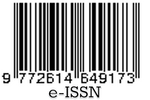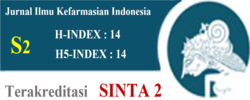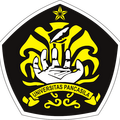Herbal Medicine Used to Increase the Libido of Male Mice (Mus musculus): Tribulus terrestris and Panax ginseng
Abstract
Tribulus terrestris and Panax ginseng are two therapeutic plants that might increase libido. The aim of the study was to see the effects of herbal medicine containing Tribulus terrestris and Panax ginseng on increasing male mice libido. This study used mice divided into two sets of 7 and 14 days. Each group was divided into four parts: control (solvent), comparator (Vitan), and test 1 (herbal medicine). Parameters measured were mice sexual behaviour (introduction, climbing, coitus), sperm concentration, sperm motility, and testicular weight. Except for coitus behaviour, there were no significant changes between groups in the 7 days of treatment. There were significant differences in introduction and climbing behaviour between the control group and test 2 after 14 days of treatment, but not in other parameters. There were no significant variations in any parameters of the mice’s libido between 7 and 14 days of treatment with 1x dose of herbal medicine; however, with 2x doses, only introduction behaviour showed a significant difference. Based on the research results, it can be concluded that administering two doses of herbal medicine can increase the frequency of treatment for 14 days.
References
2. Yafi FA, Jenkins L, Albersen M, Corona G, Isidori AM, Goldfarb S, et al. Erectile dysfunction. Natura Reviews Disease Primers. 2016;2:1-20.
3. Mobley DF, Khera M, Baum N. Recent advances in the treatment of erectile dysfunction. Postgrad Med J. 2017;93:679–85.
4. McCullough AR. Four-year review of sildenafil citrate. Reviews in urology. 2002;4(Suppl 3):S26.
5. Indrahadi D, Wardana A, Pierewan AC. The prevalence of diabetes mellitus and relationship with socioeconomic status in the Indonesian population. Jurnal Gizi Klinik Indonesia. 2021;17(3):103-12.
6. Singh R, Ali A, Jeyabalan G, et al. An overview of the current methodologies used for evaluation of aphrodisiac agents. J. Acute Dis. 2013;2:85–91.
7. Gauthaman K, Adaikan PG, Prasad RN V. Aphrodisiac properties of Tribulus Terrestris extract (protodioscin) in normal and castrated rats. Life Sciences. 2002; 71:1385–96.
8. Lee HW, Lee MS, Kim TH, Alraek T, Zaslawski C, Kim JW, Moon DG. Ginseng for erectile dysfunction: a cochrane systematic review. The World Journal of Men’s Health. 2022;40(2):264- 9.
9. Abdel-Wahhab MA, Joubert O, El-Nekeety AA, Yoon W, Kim Y, Rihn B. Aphrodisiac effects of Panax ginseng extract standardized with ginsenoside Rg3 in male rats. Gen Health Med Sci. 2014;1(1):3-8.
10. Liu ZW, Jiang N, Tao X, Wang XP, Liu XM, Xiao SY. Assessment of sexual behavior of male mice. JoVE (Journal of Visualized Experiments). 2020; 157:e60154.
11. Sumarmin R, Huda NK, Yuniarti E. In vivo test of bitter (Andrographis paniculata nees.) extract to ejaculated sperm quality. IOP Conference Series: Earth and Environmental Science 2018;130(1):012041.
12. Singh S, Nair V, Gupta YK. Evaluation of the aphrodisiac activity of Tribulus terrestris Linn. in sexually sluggish male albino rats. J Pharmacol Pharmacother. 2012; 3: 43.
13. Akram M, Asif HM, Akhtar N, et al. Tribulus terrestris Linn.: A review article. Journal of Medicinal Plants Research. 2011;5:3601–5.
14. Leung KW, Wong AS. Ginseng and male reproductive function. Spermatogenesis. 2013;3(3):e26391.
15. Habeeb IA, Sawad AA, Abbas MF. Study the effect of Panax ginseng on testicular morphology, some sperm properties and testicular histology in male Japanese quail. Biochem Cell Arch. 2020;20:6237–42.
16. Montoto LG, Arregui L, Sanchez NM, Gomendio M, Roldan ERS. Postnatal testicular development in mouse species with different levels of sperm competition. Society for Reproduction and Fertility. 2012;143:333-46.
17. Qureshi A, Naughton DP, Petroczi A. A systematic review on the herbal extract Tribulus terrestris and the roots of its putative aphrodisiac and performance enhancing effect. J. Diet Suppl. 2014;11(1):64-79.
18. Ara A, Vishvkarma R, Mehta P, Rajender S. The profertility and aphrodisiac activities of Tribulus terrestris L.: evidence from meta-analyses. Andrologia. 2023; 2023:1-21.

This work is licensed under a Creative Commons Attribution-NonCommercial-ShareAlike 4.0 International License.
Licencing
All articles in Jurnal Ilmu Kefarmasian Indonesia are an open-access article, distributed under the terms of the Creative Commons Attribution-NonCommercial-ShareAlike 4.0 International License which permits unrestricted non-commercial used, distribution and reproduction in any medium.
This licence applies to Author(s) and Public Reader means that the users mays :
- SHARE:
copy and redistribute the article in any medium or format - ADAPT:
remix, transform, and build upon the article (eg.: to produce a new research work and, possibly, a new publication) - ALIKE:
If you remix, transform, or build upon the article, you must distribute your contributions under the same license as the original. - NO ADDITIONAL RESTRICTIONS:
You may not apply legal terms or technological measures that legally restrict others from doing anything the license permits.
It does however mean that when you use it you must:
- ATTRIBUTION: You must give appropriate credit to both the Author(s) and the journal, provide a link to the license, and indicate if changes were made. You may do so in any reasonable manner, but not in any way that suggests the licensor endorses you or your use.
You may not:
- NONCOMMERCIAL: You may not use the article for commercial purposes.
This work is licensed under a Creative Commons Attribution-NonCommercial-ShareAlike 4.0 International License.





 Tools
Tools





















